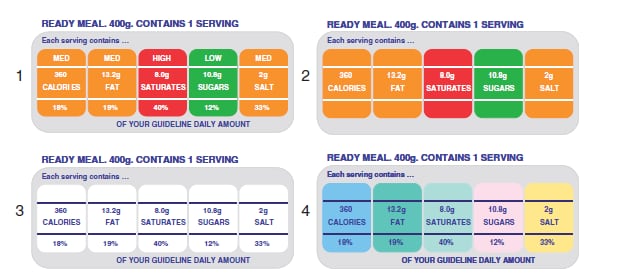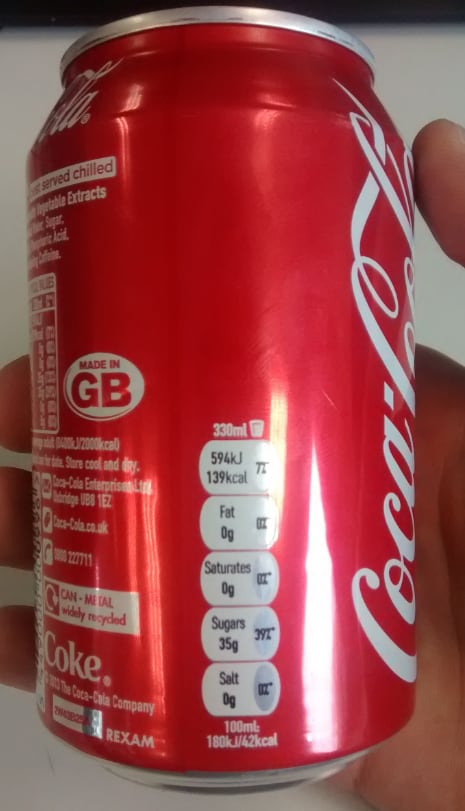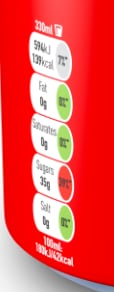Coke’s support for the voluntary scheme is a massive boost for the UK government as it pushes measures – namely its Public Health Responsibility Deal launched in 2011 – to reduce the nation’s swelling waistline.
The UK Department of Health unveiled its consistent front-of-pack (FOP) nutritional labeling proposals in June 2013 after consultations with the public, health NGOs and the food and beverage industry since spring 2012.
The DOH revealed at the time that PepsiCo, Mars and Nestle, and the major UK grocers (Sainsbury’s, Tesco, ASDA, Morrisons, the Co-operative and Waitrose) had signed-up to use traffic light (TL) labels.
Public health minister Anna Soubry said last June that research showed UK consumers preferred TL labeling to other FOP labeling schemes, and insisted that the scheme would dispel consumer confusion over different nutritional labels on food.
But Coke sat on the sidelines, insisting that existing labeling used in the EU since 2006 (showing levels of calories, sugars, fat, saturated fat and salt, and percentages of each against a daily GDA per serving) complied with the “preferred standard for consistent voluntary GDA labeling across EU member states”.
TL labels add red, orange and green color-coding to signal different nutrient levels in soft drinks. For instance, red signals ‘high’ sugar levels per serve as a percentage of a daily reference intake (RI).
Last June the DOH cited an influential 2013 study by Alizon Draper et al. comparing consumer understanding of TL and guideline daily amount (GDA) FOP labels for an imaginary ready meal – the screenshot below shows the labels subjects were presented with – which suggested adopting a single format since, “the existence of multiple FOP label formats in the marketplace may impede consumer comprehension and discourage use”.


However, some companies oppose TL labels, warning that producing UK-only labeling will give them logistical problems or of the expense of changing packaging, and arguing also that 'red light' warnings for, say, sugar or salt could lead consumers to shun certain foods.
Coke’s motives for the delay aren’t entirely clear - new labels will now appear from mid 2015 - but asked about the U-turn on TLs, a spokeswoman said: “We carefully considered the new scheme when it was announced last year but decided to continue with the single-color GDA system that was tried and tested across Europe.
“We have monitored the labeling scheme since it started to appear in-store and asked shoppers in Great Britain for their views. Our UK consumers have told us they want a single, consistent front-of-pack labeling scheme across all food and drink products to help them make the right choices for them and their families. We have therefore decided to put the new scheme on our packs here”.
Coke's new packs with TLs will show nutrient amounts and percentage reference intakes (RI) instead of GDAs. These are guidelines under EU Regulation No.1169/2011 to show approximate amounts of energy (in kilocalories/kilojoules) and nutrients that can be consumed daily as a part of a healthy diet.

The scheme will cover all Coke's British portfolio bar water brands Schweppes Abbey Well and Glaceau Smartwater.
Jane Ellison, parliamentary undersecretary of state for public health, said the UK Government was delighted Coke had adopted the scheme.
“It will help consumers make informed choices and lead a healthier lifestyle. We want all businesses to give people clear and consistent information about their food and drink,” she added.
Richard Lloyd, executive director of influential consumer group, Which?, also welcomed the news.
"With levels of obesity and diet-related disease on the increase, it’s vitally important that consumers know what is in their food. We now want the remaining food manufacturers to join the scheme," he said.
Professor Susan Jebb, University of Oxford, and chair of the Public Health Responsibility Deal Food Network, said: "I really welcome this announcement that Coca-Cola Great Britain are signing up to the Responsibility Deal pledge on Front of Pack Labeling.
"Together with their other work to decrease the sugar content of their products, introduce lower calorie options and reduce portion size, it represents a real step forward for the company in recognizing their responsibilities for public health and supporting their customers to make healthier choices and control their calorie intake," she added.
